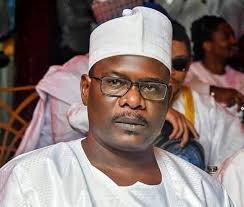The Proposal
In a bold move, Senator Ali Ndume of Borno South has called for the Nigerian government to employ the services of military contractors to eliminate Boko Haram insurgents from the North-east. Ndume, a prominent voice in the fight against terrorism, argues that the use of private military companies could fast-track efforts to restore security in Borno State, which has suffered prolonged instability due to insurgent activities. He claims that traditional military efforts have not yielded the desired results, leading to continued attacks and economic hardship for local communities.
Ndume’s proposal has sparked controversy, with many raising concerns about the accountability and cost of using private military contractors. The senator insists that, given the worsening security situation, unconventional methods like this may offer a quicker solution to rid the region of terrorists. However, critics warn that hiring military contractors could bring unintended consequences, including human rights violations and the lack of oversight typically associated with private security firms.
What many Nigerians may not realize is that military contractors have been used before in the country. During the fight against Boko Haram in 2015, South African mercenaries were secretly hired, and reports suggest they played a significant role in pushing back the insurgents. However, their presence was downplayed by the government, and their withdrawal marked the return of Boko Haram attacks. This piece of history remains largely unknown to the public, making Ndume’s suggestion even more complex.
The Nigerian military has been battling the Boko Haram insurgency for over a decade, with fluctuating successes and losses. Critics of Ndume’s proposal believe that instead of outsourcing the fight, more attention should be given to addressing the root causes of terrorism in the region, such as poverty, unemployment, and radicalization.
The Fears
Despite this success, the use of PMCs raised several issues. First, their operations were shrouded in secrecy, with little to no oversight. Human rights organizations have expressed concerns about the potential for abuses in such arrangements. Additionally, PMCs are often expensive and their long-term impact can be questionable. The argument against PMCs is that they may be a temporary fix, and their involvement can shift focus away from more enduring solutions, such as building a robust and well-trained national military. Critics argue that outsourcing security undermines national sovereignty and accountability, as contractors often operate outside of the traditional chain of command. They can offer short-term gains but may not address the deeper issues that fuel insurgencies, such as poverty, unemployment, and the ideological pull of groups like Boko Haram.
Addressing The Shadows
Several Nigerian political figures have been linked to Boko Haram through allegations of financial and logistical support. Stephen Davis**, an Australian negotiator, publicly stated that Sheriff was a key sponsor of Boko Haram. Sheriff has consistently denied the allegations, and no formal charges have been brought against him.
Senator Ali Ndume was arrested after a Boko Haram member, Ali Konduga testified that Ndume had provided support to the insurgents. Ndume defended his interactions with the group by claiming they were part of his role in peace negotiations. In 2021, old recordings surfaced in which Isa Ali Pantami, Nigeria’s Minister of Communications and Digital Economy. made statements supporting extremist groups like the Taliban and Al-Qaeda. While he has since renounced those views the controversy raised questions. Shettima Ali Monguno, a former Minister of Mines and Power and Petroleum Resources, was kidnapped by Boko Haram in 2013. While there were rumors of political connections between Monguno and insurgent financiers, no formal allegations of sponsorship were made.
In most of these cases, accusations remain unresolved or unsupported by hard evidence, which complicates the effort to hold individuals accountable. The involvement of political figures in terrorism-related activities continues to be a topic of concern, with many cases shrouded in secrecy, making it hard to definitively prove or disprove such allegations.

One common argument against the hiring of PMC’S is the high expense of hiring these contractors but the analysis shows its clear. Nigeria’s defense budget for 2024 is estimated at around ₦2.98 trillion (approximately $3.85 billion), allocated for military expenses such as salaries, equipment, logistics, and operations. This translates to an approximate daily expenditure of ₦8.16 billion (about $10.5 million), though this figure fluctuates depending on active operations and regions of deployment. It was reported that their contract cost Nigeria an estimated $400,000 to $1 million per month depending on the scale of operations and the number of personnel involved For high intensity conflict operations, this cost can rise quickly. PMCs often charge daily rates per contractor, which can range between $500 to $2,000 per day per operative, depending on the level of expertise and the type of services provided. For example, at the upper end of these estimates, hiring 100 PMC operatives could cost $200,000 per day, or ₦154 million significantly higher than the Nigerian military’s per capita cost, but potentially offering more immediate tactical success.
So there is clear contrast between the expenditure and its effectiveness of this contractors. More questions are raised to whether the solution is hiring more private military contractors or peace and stability in the nation.








